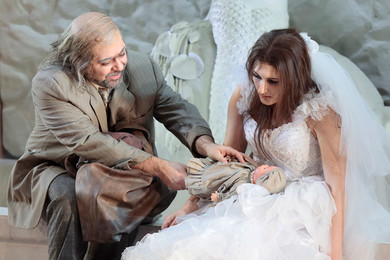New Stage
Taking possession of the well-known theme of the siren, Antonin Dvorak writes his most accomplished work which offers an intense lyricism, a boundless melodic style and a marvellous orchestral delicateness. Reality and the supernatural, earth and water, humans and ethereal beings are juxtaposed in this almost sublimely dreamlike opera. Rusalka (Czech) is an opera ('lyric fairy tale') by Antonín Dvořák. The Czech libretto was written by the poet Jaroslav Kvapil (1868-1950) based on the fairy tales of Karel Jaromír Erben and Bogena Nemcova. Rusalka is one of the most successful Czech operas, and represents a cornerstone of the repertoire of Czech opera houses. A Rusalka is a water sprite from Slavic mythology, usually inhabiting a lake or river. Dvořák had played viola for many years in pit orchestras in Prague (Estates Theatre from 1857-59 while a student, then from 1862-71 at the Provisional Theatre). He thus had direct experience of a wide range of operas by Mozart, Weber, Rossini, Lortzing, Verdi, Wagner and Smetana. Rusalka was the ninth opera he composed.
The composer began writing his opera Rusalka in the last stage of his career, at a time he was focusing almost exclusively on fairy-tale or mythical themes. His four symphonic poems inspired by the ballads from Erben’s Bouquet were followed by three operas, The Devil and Kate, Rusalka and Armida. The successful premiere of The Devil and Kate prompted Dvorak to write a new work for the theatre, and he immediately began searching for an appropriate libretto. At that time he was possibly also entertaining the idea once again of writing a setting for Karel Pippich’s drama The Death of Vlasta, which he had considered previously (it was later set to music by Otakar Ostrcil). At that time he discussed the type of libretto he was after in a newspaper interview for the daily Politik, according to which he sought a story from Czech history. Probably during the course of March 1900, through the mediation of National Theatre director Frantisek Adolf Subert, Dvorak was offered a text written by poet Jaroslav Kvapil entitled Rusalka. This fairy tale, about a water nymph who pays dearly for the chance to love a human being, struck a strong chord with Dvorak. After consulting music critic Emanuel Chvala, who also recommended the libretto, the composer accepted the text. Work on the opera took sixth months: he began writing it on 21 April 1900 and he completed Act Three on 27 November of that year. The staging of Rusalka at Prague’s National Theatre was arranged soon after the work was finished. Dvorak’s sixtieth birthday was approaching and chief conductor Karel Kovarovic planned to present the entire series of Dvorak’s operas, beginning with the world premiere of Rusalka (in the event, the complete cycle was never performed). The lead roles were assigned to the fine soprano Ruzena Maturova and one of the greatest tenors of his day, Karel Burian. Nevertheless, the premiere was almost cancelled because of Burian. “In a moment of good spirits in gay company, he forgot that he was required to keep a clear head for the important and demanding task in the role of the Prince which lay ahead of him that evening,” was how Otakar Sourek later described his indisposition. This was not the first, or the last, time such an event occurred, as Jaroslav Kvapil’s memoirs tell us: “In his usual manner, Burian sent his regrets an hour and a half before the start of the premiere and, had it not been for the understudy, the gala premiere, also attended by critics from abroad, would have come to grief.” The understudy was tenor Bohumil Ptak, who had also studied the role, but was not required until the repeat performances; moreover, on the day of the premiere, he had been recording his voice onto a phonograph cylinder. A delegation from the theatre, headed by Dvorak himself, burst into Ptak’s flat with a plea to save the premiere. Although the artist had not been present at the last few rehearsals and he only had a hazy notion of the director’s vision, he had mastered the part of the Prince and contended well with the difficult task entrusted to him. Not only did he acquit himself honourably, but his performance was ultimately one of the factors which contributed to the success of the premiere. The majority of critics present at the premiere were in agreement regarding two main points: Dvorak’s musical setting excels for its uncommonly powerful, broadly arching, lyrical melodies and masterful instrumentation which subtly evoke the “fairy-tale” world and effectively illustrate the environment in which the plot unfolds. Its great appeal also lies in its musical invention which compensates for any imperfections in the libretto and for the absence of marked dramatic conflict. In contrast, Kvapil’s text, today universally regarded as one of the finest librettos in Czech operatic literature, did not enjoy such a positive reception. It was criticised for its uninspired treatment of literary sources, the vague motivation of its characters, and for its fragmented individual motifs. Most of the critics, however, did concede the libretto’s great value as poetry, its lyricism and the “musicality” of its verse. SynopsisAct I | ||||||||||


